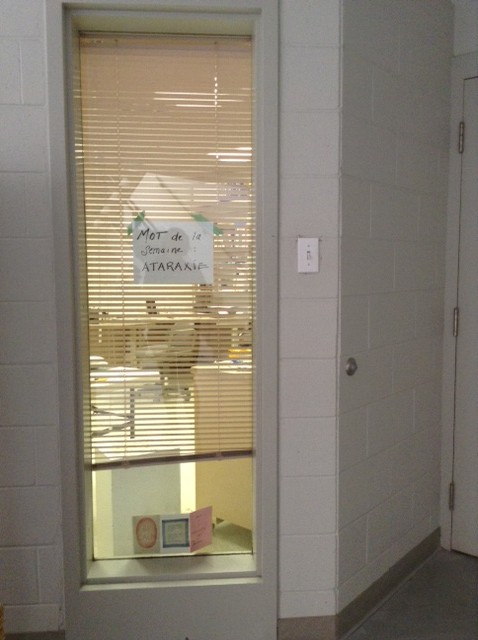That tiny shuffling of letters in words to makes, sword always fascinated me.
I like many have been completely heartbroken by the attack and subsequent murder of six men at prayer in a Ste-Foy mosque one week ago today. If only we could wind back the clock to undo this tragedy. The concluding discussion has definitely been around words and their impact. Now we talk, we write, we demonstrate and we worry this terrible knot however we can in an attempt to unravel its hold on us all.
Who are we? We are forced to ask ourselves. Tone down the rhetoric, apologize, talk to your neighbours, suggest our politicians.
But, there is much more that must be done. The Imam Hassane Guillet spoke at the funeral this Thursday in Québec City of another victim… ‘Alexandre, before being a killer he was a victim himself. Before planting his bullets in the heads of his victims, somebody planted ideas more dangerous than the bullets in his head.’ – Imam Hassan Guillet. http://www.cbc.ca/news/canada/montreal/in-his-own-words-imam-hassan-guillet-s-address-at-quebec-city-funeral-for-3-mosque-victims-1.3966917
Payam Akhavan, professor of international law at McGill was interviewed on CBC’s The Current this week. He reminds us that more is needed than expressing our sadness after the fact. We need to get in front of this abyss that risks dividing us. A cultural revolution is ORDINARY PEOPLE acting. http://podcast.cbc.ca/mp3/podcasts/current_20170131_45021.mp3
It is too easy to blame others for our problems. That kid, Alexandre Bissonnette ( he looked 17 even though he is 27) needed to be brought into a larger community, instead we allowed him to fold into his anger and frustration and unable to accept responsibility for his own situation in the world, he blamed women and immigrants.
In a recent article in the Guardian about the need to find a language of resistance, https://www.theguardian.com/commentisfree/2017/jan/17/resist-donald-trump-vocabulary-resistance-rhetoric the authors relate the history of the changing of the name of the West African country of Upper Volta to Burkina Faso – meaning, the land of the upright people.
I have been ruminating for a while now about my own type of resistance and what to do. How do I stand up and resist? When I first moved to Québec City as a young graduate of art school in the 1980’s, the older people there, confused by my accent or by my preferred state of muteness, asked my partner, “Est-ce qu’elle est canadienne?” Is she Canadian? Young people asked me if I was Québécoise or Canadienne? I grew up in the middle of a cornfield in nowhere Ontario. I only felt a strong attachment to the fields and the sky around me. My answer was this, I imagine myself like Le Petit Prince, standing upright on the earth – a little blue ball under my feet, spinning in a vast open universe. I am a citizen of Earth.
It is always an opener for conversation between strangers, “Where do you come from?” So, this is where we are. Killing each other in fear that the other covets the spot under our feet on this little blue ball, or that worse, I will have to stand beside someone I don’t know or understand.
How to find or perhaps create a vocabulary of resistance, one that doesn’t care where the other comes from, or looks like or how they dress? How do we say hello?
I have a small window on the world here at l’Université de Moncton and as their current, artist in residence, I have a tiny studio with a window that opens out onto a conjunction of several corridors and stairs. Every day I come and work on a project of transforming the pages of text (Marcel Proust’s À la recherche du temps perdu) into paper threads, which through various techniques of weaving and winding, I transpose into a kind of drawing in space. As a way of reaching out to students and as a way of beginning my own form of standing upright on this little blue ball, I have decided to participate in the coming and going of the corridor with a weekly intervention of – Le Mot de la semaine (the word of the week). My partner, Paul who is an avid apps man, gave me dictionary.com’s word of the day, ataraxia. It seemed like an appropriate word to counterbalance the turmoil – from Greek, a state of calm. Ataraxie en français. It seems to be working.
I begin my long Bonjour / Hello!
A suggestion for next week, arachnoïde.
